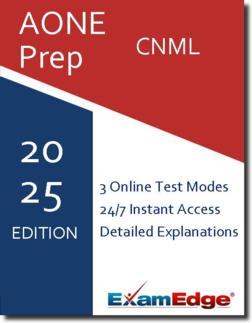AONE CNML Practice Tests & Test Prep by Exam Edge - Topics
Based on 32 Reviews
- Real Exam Simulation: Timed questions and matching content build comfort for your AONE CNML test day.
- Instant, 24/7 Access: Web-based AONE Nurse Manager and Leader Certification practice exams with no software needed.
- Clear Explanations: Step-by-step answers and explanations for your AONE exam to strengthen understanding.
- Boosted Confidence: Reduces anxiety and improves test-taking skills to ace your AONE Nurse Manager and Leader Certification (CNML).

Understanding the exact breakdown of the AONE Nurse Manager and Leader Certification test will help you know what to expect and how to most effectively prepare. The AONE Nurse Manager and Leader Certification has 100 multiple-choice questions The exam will be broken down into the sections below:
| AONE Nurse Manager and Leader Certification Exam Blueprint | ||
|---|---|---|
| Domain Name | % | Number of Questions |
| Communication and Relationship Building | 25% | 25 |
| Health Care Environment & Clinical Principles | 18% | 18 |
| Leadership | 25% | 25 |
| Professionalism | 14% | 14 |
| Business Skills and Principles | 18% | 18 |


